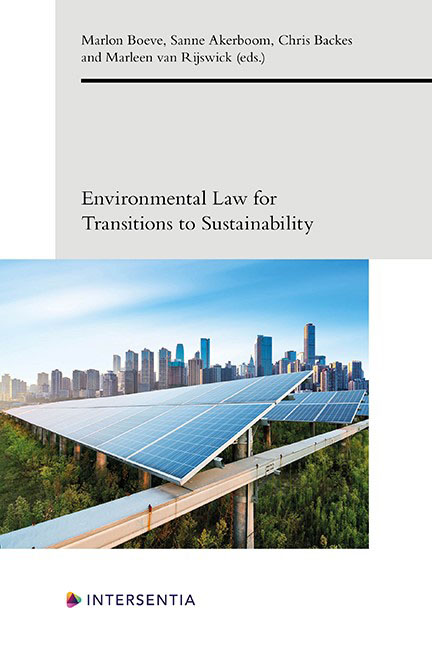Introduction
Published online by Cambridge University Press: 11 November 2021
Summary
ENVIRONMENTAL LAW FOR TRANSITIONS TO SUSTAINABILITY
In 2019 the European Environment Agency concluded that the European Union faces major environmental challenges if it is to achieve its self-imposed sustainability goals with its overall 2050 aim of ‘ living well, within the limits of our planet. ‘ These challenges are not about single issues such as reducing air pollution or better nature protection. Rather, Europe's persistent environmental challenges are systemic, in the sense that they are tied in complex ways to prevailing economic, technological and social systems. These interlinkages often make it hard to effectuate rapid reductions in environmental pressures and to get societal support for the required measures.
Over the last few decades, environmental law has significantly contributed to limiting pollution and decoupling economic growth from negative environmental effects. However, for advanced economies in Europe and elsewhere, reconciling high levels of human development (living well) with environmental sustainability (living within environmental limits) is expected to require a five-fold or even ten-fold improvement in environmental performance. Moreover, in some areas, like biodiversity loss, we have already gone beyond the capacity of our world. The current challenges require considering out-of-the-box solutions, integrated and inclusive approaches by both public and private actors and cross-border sets of instruments. Therefore, the EU (and the international community) must find new ways to achieve fundamental transitions to sustainability in core systems, entailing ‘profound changes in dominant institutions, practices, technologies, policies, lifestyles and thinking’.
In order to promote the legal discussion about ways to achieve fundamental transitions to sustainability, Utrecht University hosted the Seventh European Environmental Law Forum (EELF) Conference from 28 to 30 August 2019. The central question of the conference was what support law can offer to facilitate or even accelerate these transformation processes and how it can provide guidance on the different pathways to sustainability. Which kind of law do we need to encourage innovations for more sustainable solutions ? How can innovation be ensured, without endangering public health and safety and environmental quality ?
- Type
- Chapter
- Information
- Publisher: IntersentiaPrint publication year: 2021

